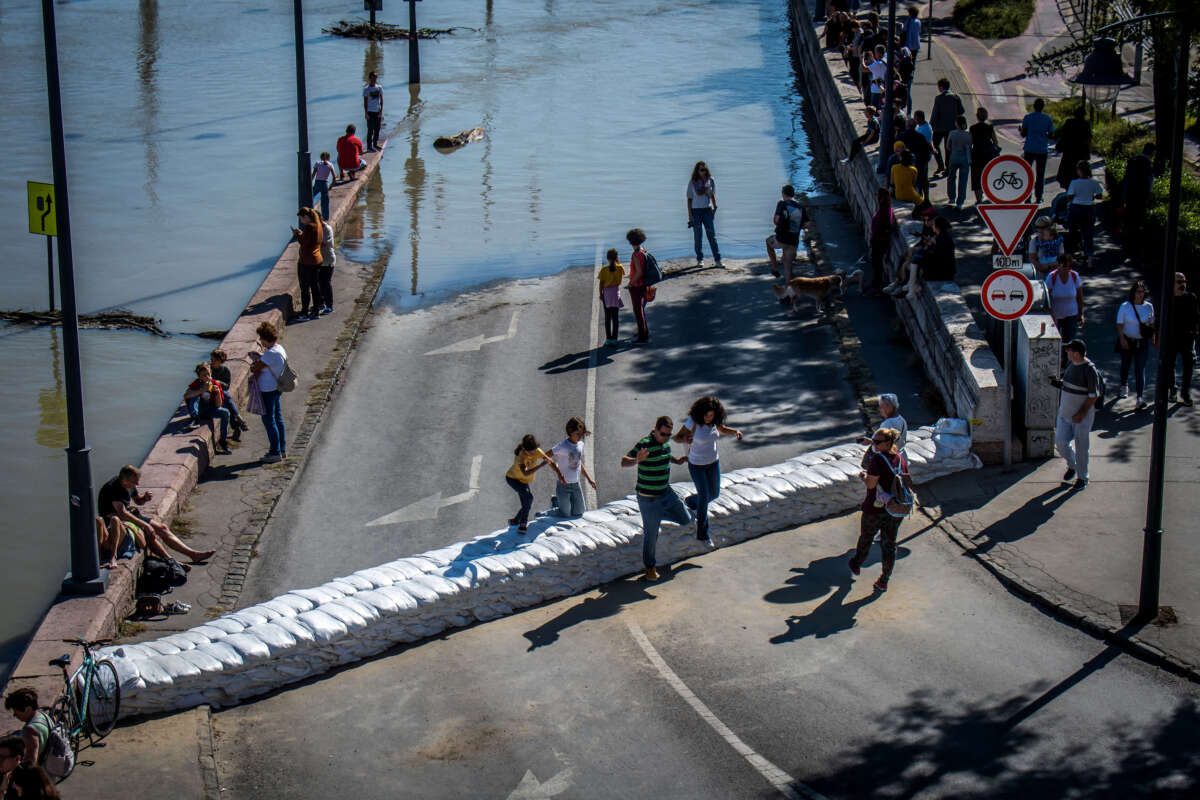A large storm system that affected parts of Central and Eastern Europe earlier this year was two times more likely due to the effects of human-made climate change, a new report indicates.
Storm Boris, which affected countries like Austria, Poland and Romania in mid-September, resulted in catastrophic floods that killed around two dozen people. In many cities, however, early warnings from weather forecasters allowed people time to prepare, and infrastructure improvements protected residents from the worst effects of the floods.
While such preparations are lifesaving, it is also essential to limit the amount of fossil fuels that are being put into the atmosphere to ensure that the climate crisis doesn’t worsen in the future, experts have said.
“Unless we stop burning fossil fuels, this rainfall and the associated flooding will only get worse,” said Friederike Otto, climatologist at the Imperial College London and a co-author of a report from World Weather Attribution, an international organization of scientists and meteorologists who study the role climate change plays in extreme weather events.
That organization’s analysis found that the massive rainfall during Storm Boris was twice as likely due to the effects of human-made climate change.
The storm produced between 7 and 20 percent more rain than a similar storm from the pre-industrial era, the report concluded.
The climate crisis has increased the intensity of such storms for a variety of reasons. In this storm’s case, for example, warmer temperatures resulted in more water in the atmosphere — for each degree Celsius that the earth is warmer than it was 100 years ago, the atmosphere holds around 7 percent more water, which intensifies storms.
“Temperature is increasing. The atmosphere can hold more moisture because it’s warmer. And then you can have more extreme rainfall,” Andreas Prein, a climate scientist based in Zurich, Switzerland, told NPR.
In the U.S., the climate crisis hasn’t played a major role in the 2024 election cycle, with neither major presidential candidate making the issue a pillar of their strategy. Republican nominee Donald Trump, however, has repeatedly downplayed the danger of the crisis, wrongly claiming earlier this year that rising sea levels would be beneficial, rather than catastrophic.
“Basically, you’ll have a little bit more beachfront property,” Trump said in one interview.
Although she has not discussed the climate crisis extensively at campaign events, the Democratic nominee, Vice President Kamala Harris, says on her website that, if elected, she will advance “environmental justice, [protect] public lands and public health,” and “increase resilience to climate disasters.” However, her platform does not outline specific policies she plans on implementing.
Notably, while the Biden-Harris administration has allocated billions to addressing the climate crisis within the Inflation Reduction Act, the spending is far from the amount needed to address the gravity of the crisis, experts have said. Meanwhile, the administration has approved nearly twice the number of oil and gas permits for wells on federal land that Trump did during his first three years in the White House — and U.S. crude oil production reached an all-time high under Biden.
Help us Prepare for Trump’s Day One
Trump is busy getting ready for Day One of his presidency – but so is Truthout.
Trump has made it no secret that he is planning a demolition-style attack on both specific communities and democracy as a whole, beginning on his first day in office. With over 25 executive orders and directives queued up for January 20, he’s promised to “launch the largest deportation program in American history,” roll back anti-discrimination protections for transgender students, and implement a “drill, drill, drill” approach to ramp up oil and gas extraction.
Organizations like Truthout are also being threatened by legislation like HR 9495, the “nonprofit killer bill” that would allow the Treasury Secretary to declare any nonprofit a “terrorist-supporting organization” and strip its tax-exempt status without due process. Progressive media like Truthout that has courageously focused on reporting on Israel’s genocide in Gaza are in the bill’s crosshairs.
As journalists, we have a responsibility to look at hard realities and communicate them to you. We hope that you, like us, can use this information to prepare for what’s to come.
And if you feel uncertain about what to do in the face of a second Trump administration, we invite you to be an indispensable part of Truthout’s preparations.
In addition to covering the widespread onslaught of draconian policy, we’re shoring up our resources for what might come next for progressive media: bad-faith lawsuits from far-right ghouls, legislation that seeks to strip us of our ability to receive tax-deductible donations, and further throttling of our reach on social media platforms owned by Trump’s sycophants.
We’re preparing right now for Trump’s Day One: building a brave coalition of movement media; reaching out to the activists, academics, and thinkers we trust to shine a light on the inner workings of authoritarianism; and planning to use journalism as a tool to equip movements to protect the people, lands, and principles most vulnerable to Trump’s destruction.
We urgently need your help to prepare. As you know, our December fundraiser is our most important of the year and will determine the scale of work we’ll be able to do in 2025. We’ve set two goals: to raise $150,000 in one-time donations and to add 1,500 new monthly donors by midnight on December 31.
Today, we’re asking all of our readers to start a monthly donation or make a one-time donation – as a commitment to stand with us on day one of Trump’s presidency, and every day after that, as we produce journalism that combats authoritarianism, censorship, injustice, and misinformation. You’re an essential part of our future – please join the movement by making a tax-deductible donation today.
If you have the means to make a substantial gift, please dig deep during this critical time!
With gratitude and resolve,
Maya, Negin, Saima, and Ziggy
